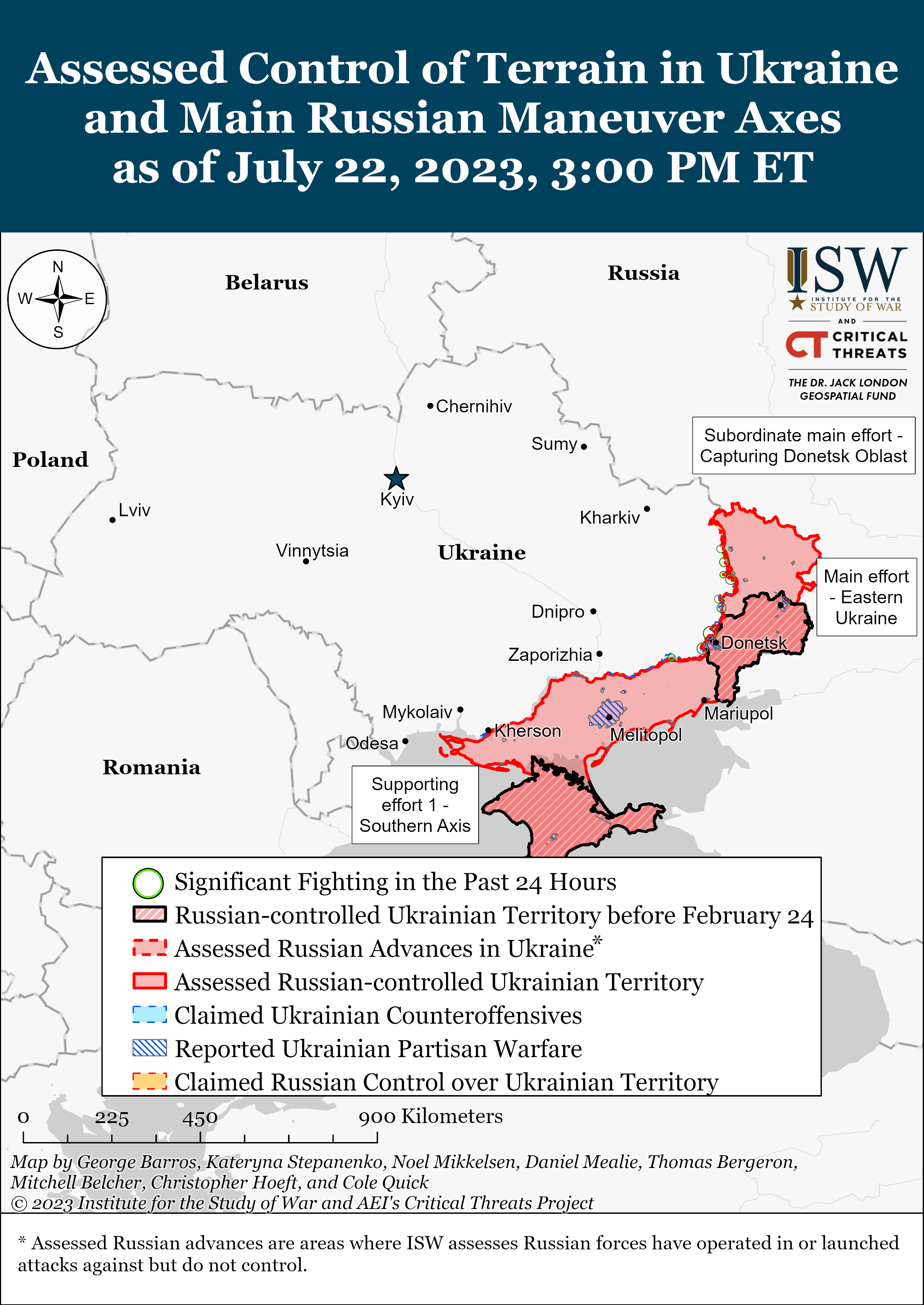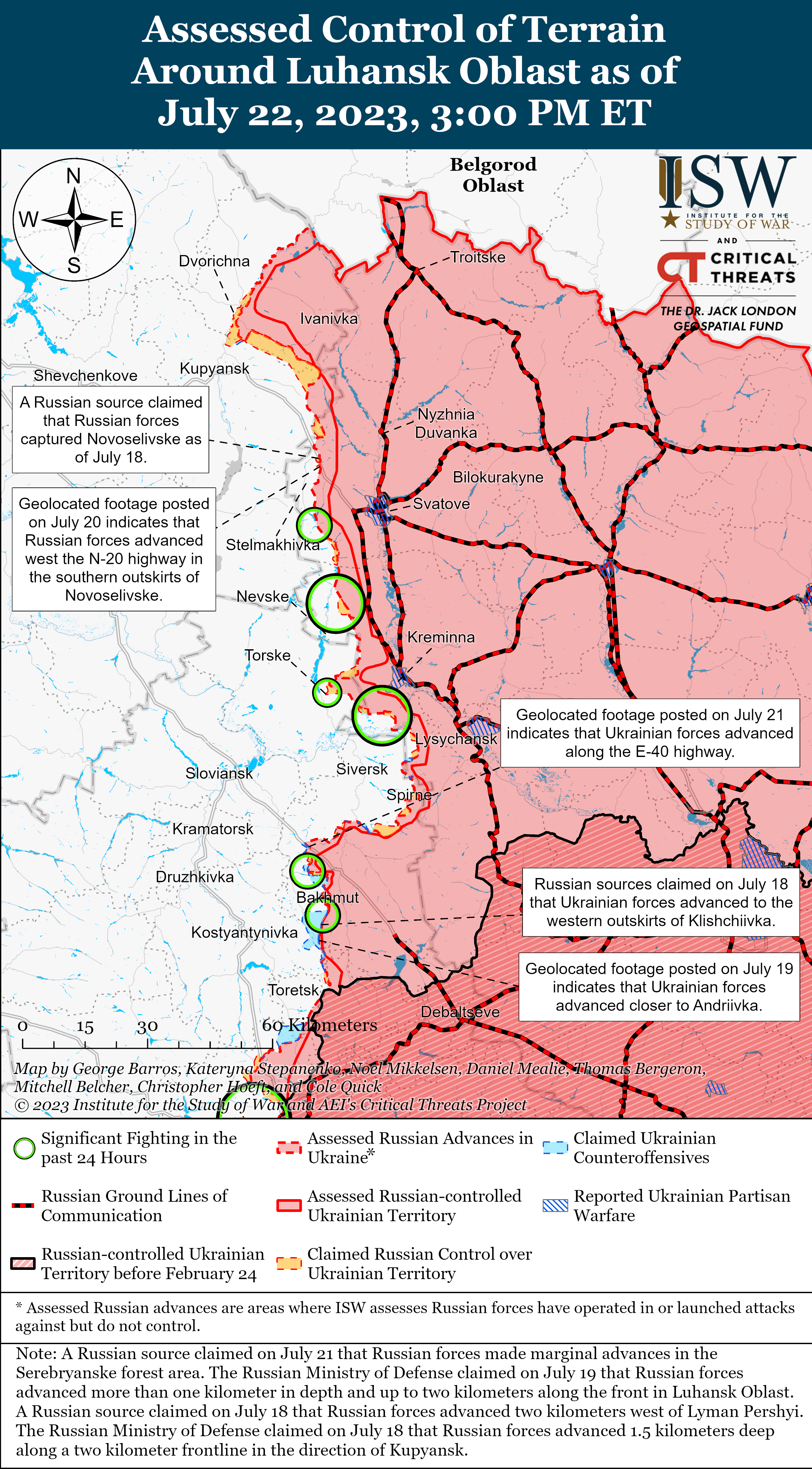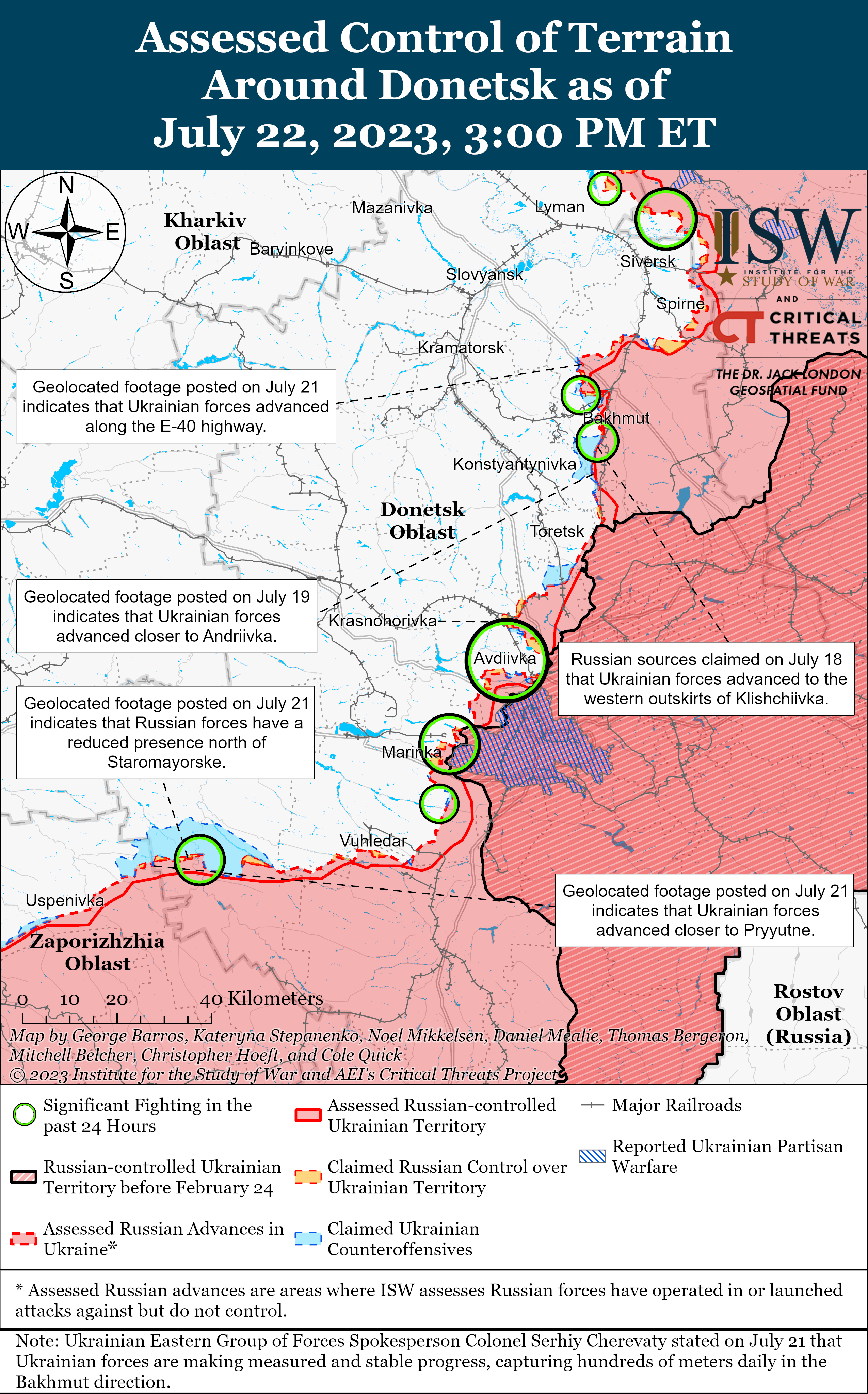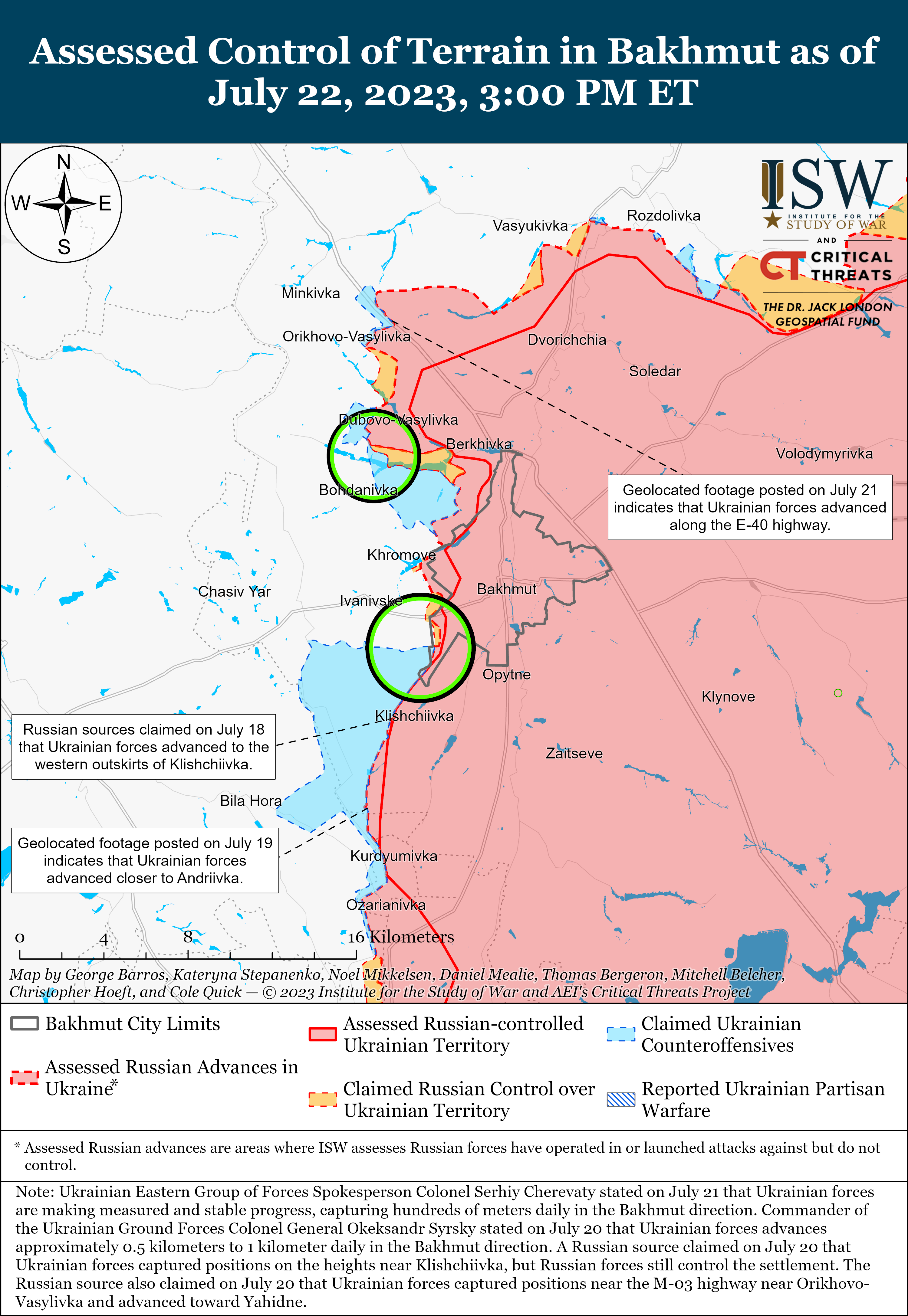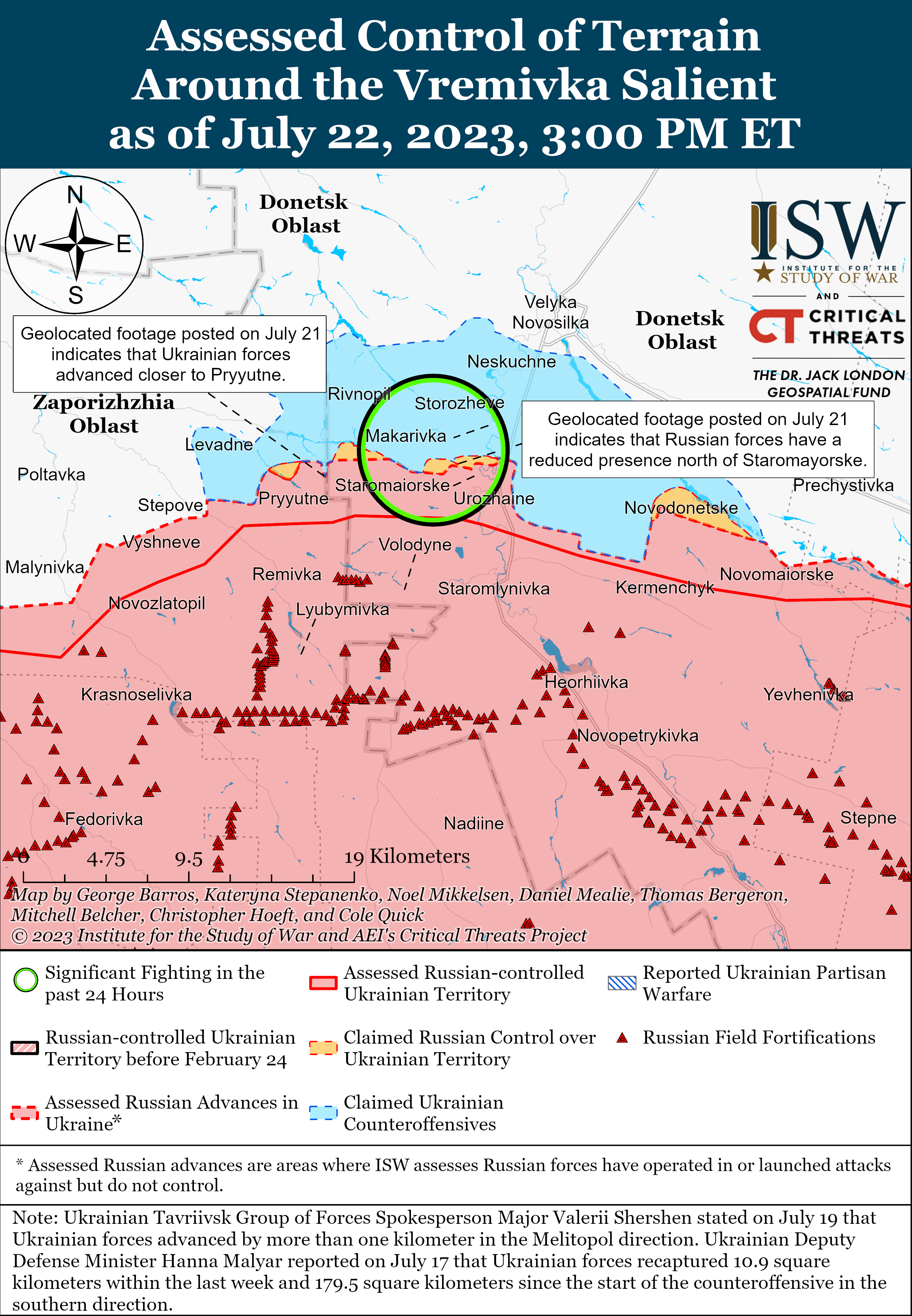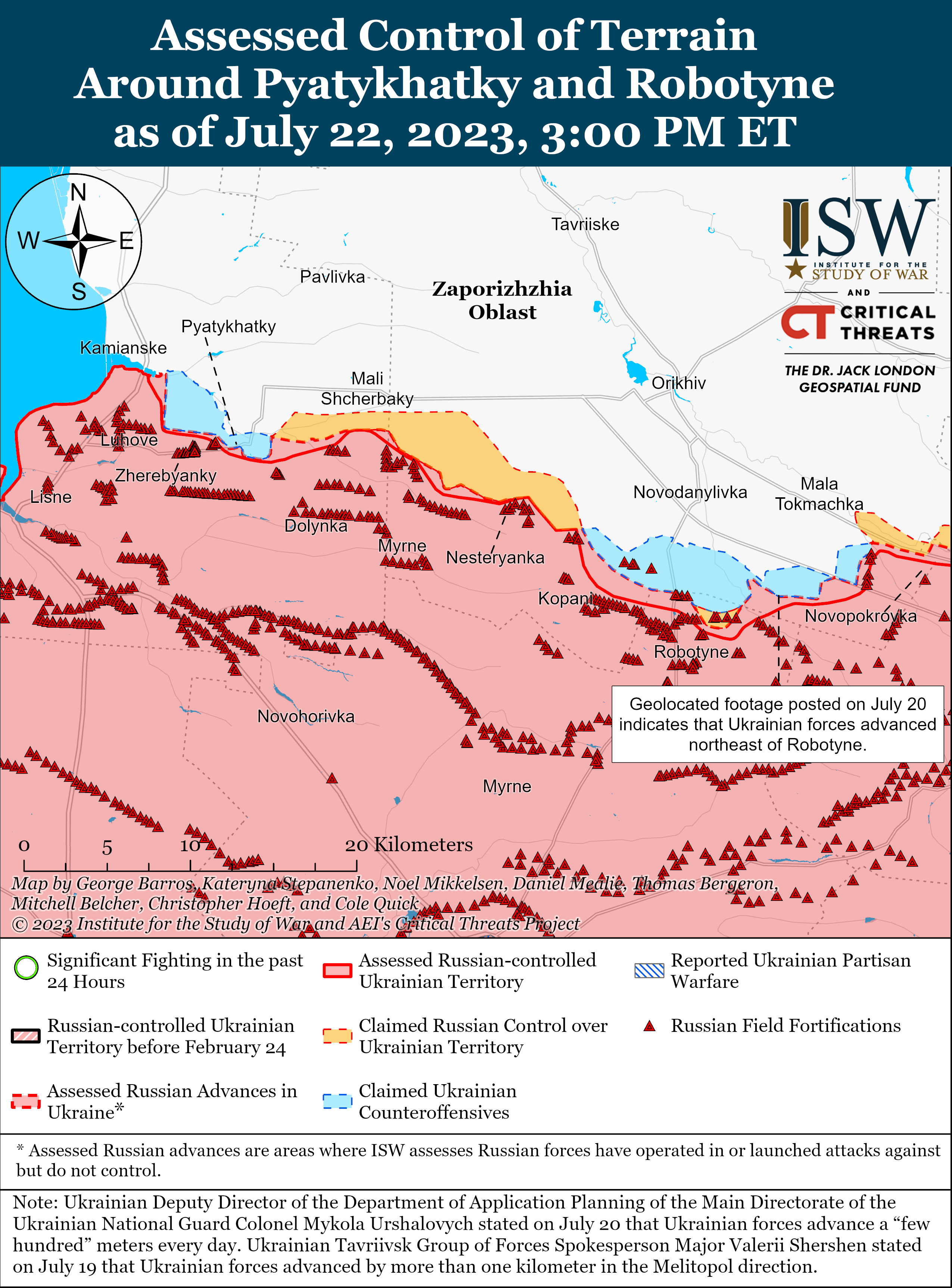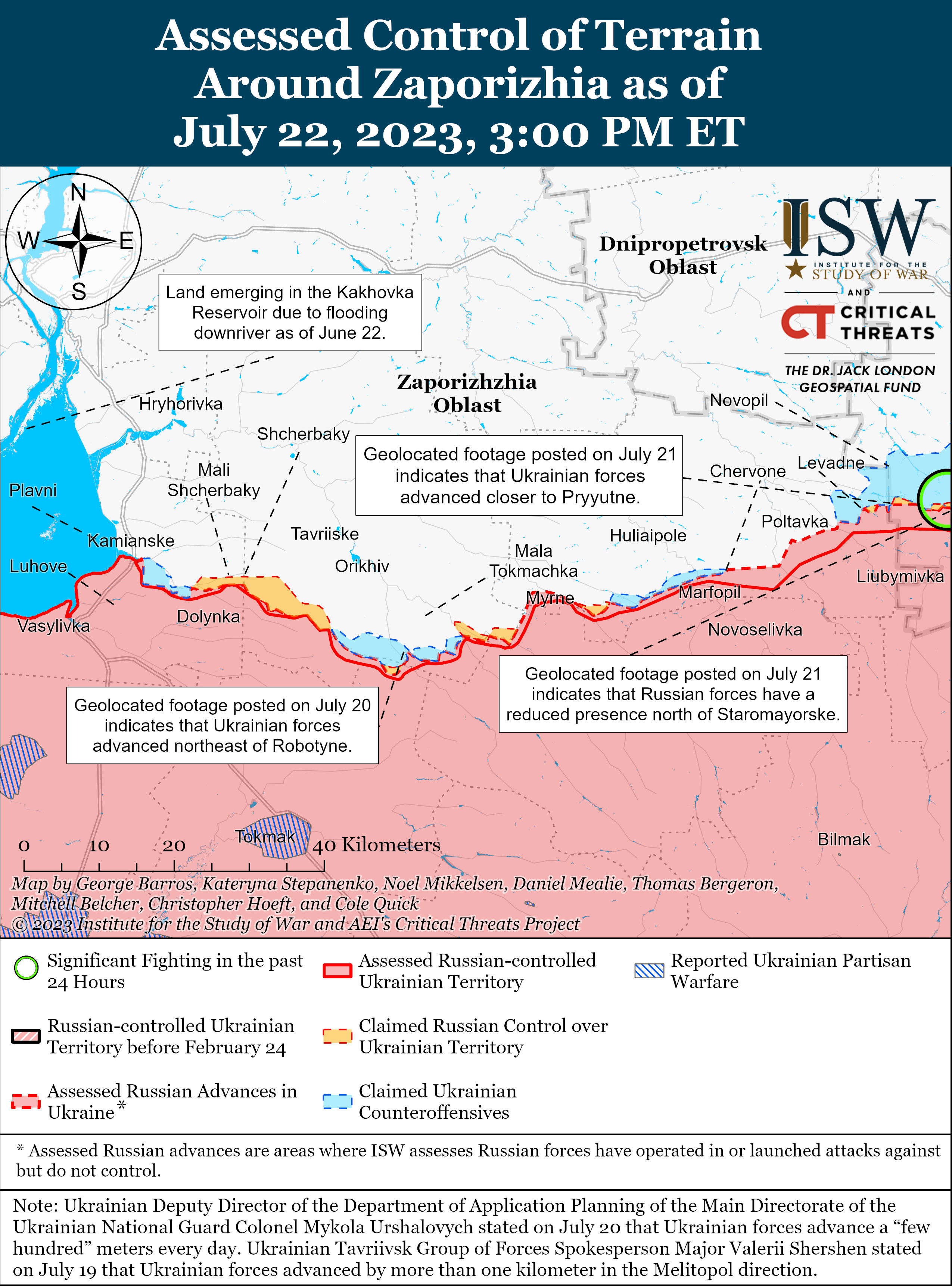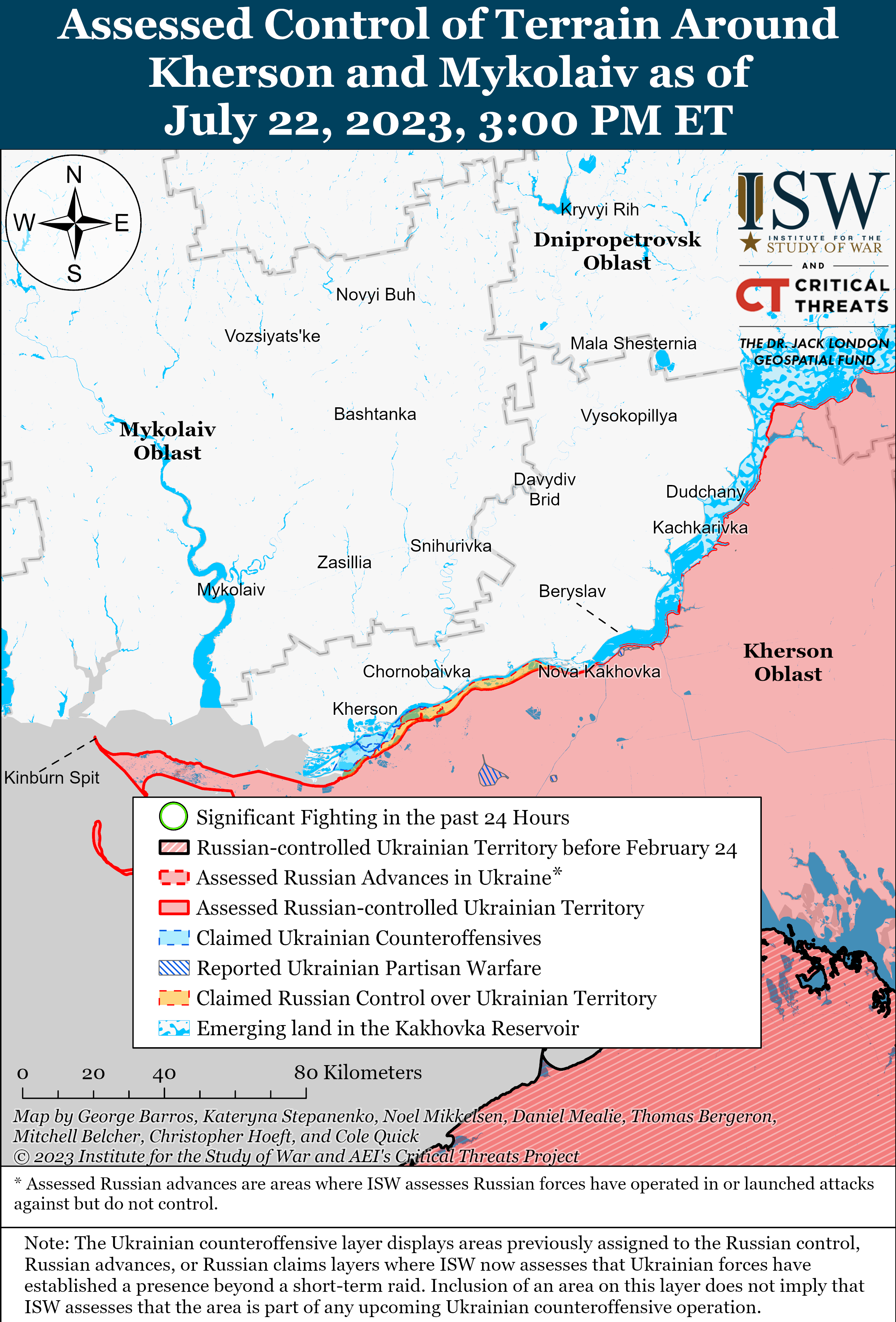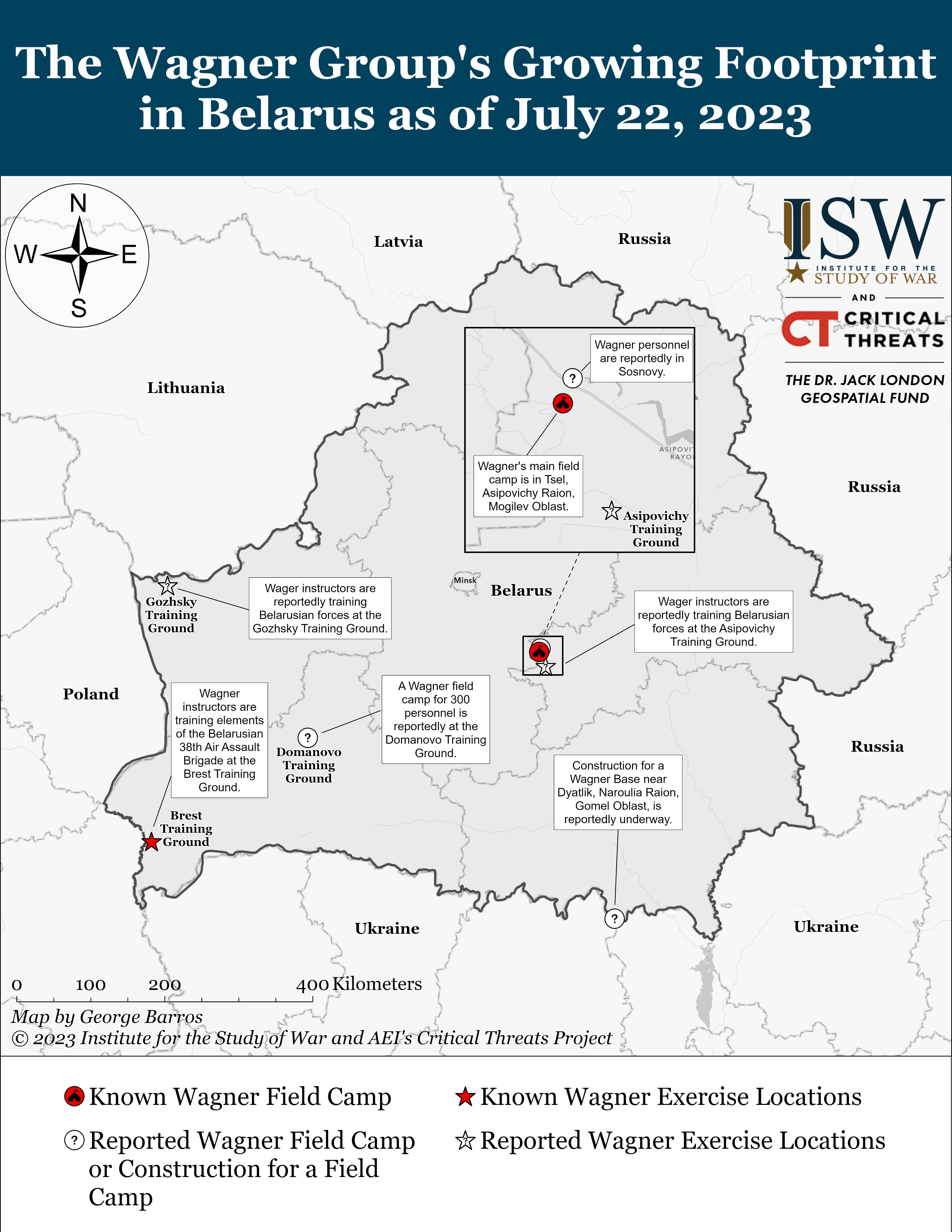Russian Offensive Campaign Assessment, July 22, 2023
AFGHANISTAN, July 23 - Russian Offensive Campaign Assessment, July 22, 2023
Riley Bailey, Nicole Wolkov, Angelica Evans, George Barros, and Frederick W. Kagan
July 22, 2023, 8:30pm ET
Click here to see ISW’s interactive map of the Russian invasion of Ukraine. This map is updated daily alongside the static maps present in this report.
Click here to access ISW’s archive of interactive time-lapse maps of the Russian invasion of Ukraine. These maps complement the static control-of-terrain map that ISW produces daily by showing a dynamic frontline. ISW will update this time-lapse map archive monthly.
Note: The data cutoff for this product was 1:00pm ET on July 22. ISW will cover subsequent reports in the July 23 Russian Offensive Campaign Assessment.
Ukrainian forces continued counteroffensive operations on at least three sectors of the front on July 22. The Ukrainian General Staff reported that Ukrainian forces conducted counteroffensive operations in the Berdyansk (Zaporizhia-Donetsk Oblast area) and Melitopol directions (western Zaporizhia Oblast).[1] The Russian Ministry of Defense (MoD) claimed that Russian forces repelled 14 Ukrainian attacks south of Kreminna, Luhansk Oblast, and in the Bakhmut area.[2] The Ukrainian General Staff did not publish a situation report about its counteroffensive operations on July 22.
Ukrainian President Volodymyr Zelensky stated that Ukrainian counteroffensive operations may soon increase in tempo and that the delay in counteroffensive operations was in part due to limited materiel. Zelensky stated at the Aspen Security Forum on July 21 that Ukrainian forces had plans to launch counteroffensive operations in the spring but that a lack of munitions and military equipment, such as mine-clearing equipment and continued Ukrainian training abroad, necessitated a delay.[3] Zelensky noted that the delay in Ukrainian counteroffensive operations allowed Russian forces to establish minefields and multiple defensive lines.[4] ISW assessed in January 2023 that the provision of Western weapons and materiel to Ukraine has been essential to Ukraine’s previous ability to conduct successful counteroffensive operations and that delays between Western pledges to send higher-end Western systems to Ukraine and the arrival of those systems likely hinder Ukraine’s ability to initiate and sustain large-scale counteroffensive operations.[5] Zelensky stated that counteroffensive operations may soon increase in tempo due to ongoing mine-clearing operations.[6] US Secretary of State Antony Blinken stated on July 21 at the Aspen Security Forum that it is too early to draw conclusions about Ukrainian counteroffensive operations and that Ukraine will likely “make a profound difference” on the battlefield as Kyiv commits all of the forces that Ukraine prepared for the counteroffensive.[7]
Ukrainian officials stated on July 22 that Ukraine’s interdiction campaign against Russian military targets in rear areas is successfully degrading Russian logistics and counterbattery capabilities, likely contributing to an asymmetrical attrition gradient in Ukraine’s favor. Ukrainian Chief of the Main Directorate of Missile Troops and Artillery and Unmanned Systems of the General Staff Colonel Serhiy Baranov stated on July 22 that Ukrainian missile and artillery units are responsible for approximately 90 percent of Russian losses.[8] Baranov stated that Ukrainian missile and artillery units have created a long-range “fire fist” thanks to Western high-precision missiles and artillery systems and that Ukrainian strikes are so powerful and accurate that Russian forces can no longer conduct effective counterbattery fire.[9] Ukrainian Southern Operational Command Spokesperson Captain First Rank Nataliya Humenyuk stated on July 22 that Ukrainian attacks on Russian ammunition concentrations in deep rear areas are causing logistical issues for the Russian military.[10] Humenyuk noted that this trend is reflected in decreased Russian shelling in Kherson Oblast, which indicates that Russian forces are experiencing “shell hunger” in the area.[11] Ukrainian Tavriisk Group of Forces Commander Brigadier General Oleksandr Tarnavskyi compared Ukraine’s counteroffensive to boxing on July 13 and stated that Ukraine intends to “hold the opponent at arm’s length” in order to avoid close combat because Ukraine can effectively defeat Russian forces from a long distance, likely referencing Ukraine’s continued interdiction campaign in eastern and southern Ukraine.[12] Baranov’s, Humenyuk’s, and Tarnavskyi’s statements suggest that the Ukrainian military is successfully carrying out this interdiction campaign. This campaign is a central aspect of Ukraine’s plan to create an asymmetrical attrition gradient that conserves Ukrainian manpower at the cost of a slower rate of territorial gains while gradually wearing down Russian manpower and equipment.[13]
Ukrainian forces struck a Russian oil depot and ammunition depot in Crimea as part of this Ukrainian pressure campaign. The Ukrainian Armed Forces reported on July 22 that Ukrainian forces destroyed an oil depot and ammunition depot near Oktyabrske, Krasnohvardiiske Raion, Crimea.[14] Russian sources claimed that Ukrainian forces also struck an airfield near Oktyabrske where Russian forces have reportedly been stockpiling equipment for a month.[15] Crimea occupation head Sergey Aksyonov confirmed that Ukrainian forces struck an ammunition depot, causing it to explode and prompting occupation officials to evacuate residents within a five-kilometer radius of the depot.[16] Aksyonov also stated that Russian authorities suspended rail traffic on the Kerch Strait bridge to minimize risk.[17] A Kremlin-affiliated milblogger claimed that Ukrainian forces launched two Storm Shadow cruise missiles, while other milbloggers claimed that Ukrainian forces used an unspecified number of drones for the strike.[18] ISW cannot confirm what kind of weapons Ukrainian forces used in this strike. A prominent Russian milblogger tied today’s strike to Ukraine’s previous strikes on Russian military warehouses in Crimea and the Chonhar and Kerch Strait bridges.[19] The milblogger claimed that Ukrainian strikes are aimed at disrupting Russian logistics and creating “shell hunger” in Russia’s forces fighting in southern Ukraine.[20]
Russian strikes against Ukrainian shipping and agricultural infrastructure in southern Ukraine may be subsiding or entering a temporary lull. The intensity of Russian drone and missile strikes against Ukrainian shipping and agricultural infrastructure in southern Ukraine has steadily decreased since July 19. The Ukrainian General Staff reported that Russian forces launched only five Shahed drones from the southeast direction – all of which Ukrainian air defense reportedly intercepted – on July 22.[21] In comparison, Russian forces launched 19 Shahed drones, four Iskander missiles, and three Kalibr missiles against Ukraine on July 21.[22] Russian forces launched seven Onyx cruise missiles, four Kh-22 anti-ship missiles, three Kalibr sea-based cruise missiles, five Iskander ballistic missiles, and 19 Iranian-made Shahed drones on July 20.[23] Russian forces fired even more ordnance at Ukraine on July 18 and 19, respectively.[24]
Further details about former Russian officer and ardent nationalist Igor Girkin’s arrest for extremism continue to suggest a shifting balance of power among Kremlin factions and a notable factionalism within the Russian Federal Security Service (FSB), in which Girkin had served. ISW has consistently assessed that Girkin likely had the backing of an unknown silovik, possibly within the FSB since Girkin was a former FSB officer and consistently used passports under fictitious names that he received from the FSB.[25] Russian sources, including the Angry Patriots Club, amplified a document from Girkin’s lawyer, Alexander Molokhov, on July 22 purporting to show that FSB investigators initiated the criminal case against Girkin on July 18 and that the Moscow Department of the FSB’s Service for the Protection of the Constitutional Order and Combating Terrorism (SZKSBT) provided the materials for the case.[26] Girkin previously suggested that the head of the SZKSBT’s Department for the Protection of the Constitutional Order (UZKS), Lieutenant General Aleksey Zhalo, censored Girkin’s July 9 speaking engagement at a bookstore in St. Petersburg.[27] Zhalo and Girkin have had a longstanding feud after Girkin publicly criticized Zhalo for the arrest of ultranationalist figures in 2018 and for failing to combat the Ukrainian Azov Regiment’s recruitment measures.[28]
The involvement of the SZKSBT in Girkin’s case may be indicative of this personal struggle, although it may also suggest a degree of factionalism within the FSB itself. The alleged document also states that the FSB’s Center for Criminalistics (TsST) formally assessed on July 17 that Girkin’s May 25, 2022 Telegram posts, likely referencing comments he made criticizing a lack of payments to Russian personnel, constituted a crime.[29] The TsST and SZKSBT may have approved the initiation of Girkin’s criminal case because FSB leadership decided to stop protecting Girkin as he increasingly became more adversarial towards the Kremlin. It is also possible that the two FSB entities acted on longstanding desires to arrest Girkin after a potential shift in the balance of power in the Kremlin to the FSB’s detriment. FSB Director Alexander Bortnikov reportedly secured security guarantees for Wagner Group financier Yevgeny Prigozhin in negotiations to end Wagner’s June 24 rebellion and may have lost what appeared to be the Kremlin’s increasing backing for the FSB.[30] Girkin himself recently claimed that Prigozhin’s rebellion shifted the balance of power within the Kremlin to favor factions hostile to the FSB and other Russian security organs.[31] Russian authorities’ recent initiation of criminal cases against other prominent Telegram administrators and ultranationalist figures with connections to the FSB and Russian security services suggests that select Russian officials may be trying to undermine the reputation of these security structures in the wake of a potential shift in the influence of Kremlin factions.[32]
Girkin’s affiliates have launched a public effort to cast Girkin as an embattled figure in opposition to the Russian leadership. Angry Patriots Club members gathered at the Moscow Meshansky Court on July 21 and denounced the court’s charges against Girkin and its decision to remand Girkin at an unspecified pre-trial detention center until September 18.[33] Angry Patriots Club Chairman Pavel Gubarev stated in front of the court that the group would fight for Girkin’s release by any legal means and accused Russian leadership of using all of its resources to knock Girkin out of his “public work.”[34] Angry Patriots member and the coordinator for the Other Russia Party, Eduard Limonov, announced in front of the court that the Angry Patriots Club will launch a public campaign defending Girkin as a “political prisoner.”[35] Russian authorities detained Gubarev, Limonov, and Angry Patriots member Yan Sidorov for their demonstrations in front of the court, but later released them.[36] Girkin’s Telegram channel posted on July 22 a screed against Russian authorities for punishing Girkin, a “patriot... who gave his whole life to the service of the motherland,” while allowing those that took part in Wagner’s rebellion to escape punishment.[37] Girkin’s Telegram signed the post as “the Russian Movement in Support of Igor Strelkov” indicating that Girkin’s affiliates intend to galvanize widespread public support for Girkin.[38] It is unclear if Girkin’s affiliates, specifically those in the Angry Patriots Club, will succeed in this effort given that they represent a small, insular group within the wider Russian ultranationalist community.
Girkin’s arrest has not generated widespread outrage in the Russian ultranationalist community as some previous cases have, suggesting an increasing fragmentation within the information space. Russian milbloggers notably did not express anger at Girkin’s arrest as they have in previous instances when Russian authorities have attempted to censor ultranationalist figures. Russian milbloggers recently decried Russian authorities charging pro-war Russian military doctor Yuri Yevich with discrediting the Russian military for offering a negative assessment of the state of Russian combat medicine.[39] The milbloggers defended Yevich and criticized Russian authorities for targeting someone they deemed to be a Russian patriot. Outrage at Girkin’s arrest and the subsequent defense of his patriotism was limited to members and supporters of the relatively isolated and small Angry Patriots Club, which Girkin launched in April, by contrast.[40] Girkin’s critics in the Russian ultranationalist information space notably did not celebrate his arrest, however. The lack of widespread outrage among milbloggers suggests that Girkin’s arrest is unlikely to deeply agitate the majority of the Russian ultranationalist community and Russian military personnel, contrary to some Western reporting. The tepid response from Russian milbloggers concerning Girkin’s arrest and Wagner-affiliated milbloggers’ continued support for Prigozhin after the Wagner rebellion likely indicates an increasing fragmentation within the Russian ultranationalist community along factional affiliations and significant ideological differences about Russia’s approach to the war in Ukraine.[41]
Girkin’s arrest is likely not an indicator of a wider effort to censor the Russian ultranationalist community, but rather an attempt to excise a specific segment of the community that is vocally hostile to the Kremlin. Russian insider sources claimed on July 22 that Russian Duma Deputy Oleg Matveychev recently submitted a report to the Russian Presidential Administration proposing to recognize Girkin as a foreign agent in support of an overall effort to encourage self-censorship among jingoistic patriots that criticize the Russian leadership.[42] ISW cannot verify these claims, although they suggest that the Kremlin may have been in active discussions about how it could silence the section of the ultranationalist community that Girkin represents. Putin has routinely sought to maintain relationships with select milbloggers in a bid to leverage their connections to the wider Russian ultranationalist community, and Girkin’s arrest does not likely portend a Kremlin effort to reverse course on courting the increasingly prominent ultranationalist milblogger community.[43] Girkin’s arrest does suggest that the Kremlin views those whose criticism passes certain not entirely clear boundaries as a threat, particularly following the Wagner Group rebellion that aimed to replace Russia’s military leadership.
Key Takeaways:
- Ukrainian forces continued counteroffensive operations on at least three sectors of the front on July 22.
- Ukrainian President Volodymyr Zelensky stated that Ukrainian counteroffensive operations may soon increase in tempo and that the delay in counteroffensive operations was in part due to limited materiel.
- Ukrainian officials stated on July 22 that Ukraine’s interdiction campaign against Russian military targets in rear areas is successfully degrading Russian logistics and counterbattery capabilities, likely contributing to an asymmetrical attrition gradient in Ukraine’s favor.
- Ukrainian forces struck a Russian oil depot and ammunition depot in Crimea as part of this Ukrainian pressure campaign.
- Russian strikes against Ukrainian shipping and agricultural infrastructure in southern Ukraine may be subsiding or entering a temporary lull.
- Further details about former Russian officer and ardent nationalist Igor Girkin’s arrest for extremism continue to suggest a shifting balance of power among Kremlin factions and a notable factionalism within the Russian Federal Security Service (FSB), in which Girkin had served.
- Girkin’s affiliates have launched a public effort to cast Girkin as an embattled figure in opposition to Russian leadership.
- Girkin’s arrest has not generated widespread outrage in the Russian ultranationalist community as some previous cases have, suggesting an increasing fragmentation within the information space.
- Girkin’s arrest is likely not an indicator of a wider effort to censor the Russian ultranationalist community, but rather an attempt to excise a specific segment of the community that is vocally hostile to the Kremlin.
- Ukrainian forces conducted offensive operations along the Kupyansk-Svatove-Kreminna line and in the Bakhmut area but did not make gains.
- Russian forces conducted offensive operations in the Kupyansk and Bakhmut areas and along the Avdiivka-Donetsk City line and made claimed advances in the Kupyansk area.
- Ukrainian forces conducted offensive operations along the western Donetsk-eastern Zaporizhia Oblast border area and in western Zaporizhia Oblast but did not make advances.
- Russian forces conducted offensive operations along the western Donetsk-eastern Zaporizhia Oblast border area but did not make any confirmed or claimed advances.
- Prominent Russian Federation Council members opposed a bill aimed at increasing the upper age limit for the conscription age while maintaining the lower limit of 18.
- Russian occupation authorities continue to relocate Ukrainian children in occupied Ukraine to Russia.
- The Wagner Group’s footprint in Belarus is likely expanding.
We do not report in detail on Russian war crimes because these activities are well-covered in Western media and do not directly affect the military operations we are assessing and forecasting. We will continue to evaluate and report on the effects of these criminal activities on the Ukrainian military and the Ukrainian population and specifically on combat in Ukrainian urban areas. We utterly condemn these Russian violations of the laws of armed conflict, Geneva Conventions, and humanity even though we do not describe them in these reports.
- Russian Main Effort – Eastern Ukraine (comprised of two subordinate main efforts)
- Russian Subordinate Main Effort #1 – Capture the remainder of Luhansk Oblast and push westward into eastern Kharkiv Oblast and encircle northern Donetsk Oblast
- Russian Subordinate Main Effort #2 – Capture the entirety of Donetsk Oblast
- Russian Supporting Effort – Southern Axis
- Russian Mobilization and Force Generation Efforts
- Activities in Russian-occupied areas
Russian Main Effort – Eastern Ukraine
Russian Subordinate Main Effort #1 – Luhansk Oblast (Russian objective: Capture the remainder of Luhansk Oblast and push westward into eastern Kharkiv Oblast and northern Donetsk Oblast)
Russian sources claimed that Ukrainian forces conducted offensive operations along the Kupyansk-Svatove-Kreminna line without advancing on July 22. Russian Western Grouping of Forces Spokesperson Sergey Zybinsky claimed that Ukrainian forces unsuccessfully counterattacked near Masyutivka (13km northeast of Kupyansk) and Petropavlivka (7km east of Kupyansk).[44] The Russian MoD claimed that Ukrainian forces launched seven unsuccessful attacks near Karmazynivka (12km southwest of Svatove), Novovodyane (15km southwest of Svatove), Kreminna, and Dibrova (6km southwest of Kreminna).[45] The Russian MoD also claimed that Ukrainian forces launched unsuccessful attacks near Bilohorivka (12km south of Kreminna), Spirne (25km south of Kreminna), and Berestove (30km south of Kreminna) in Donetsk Oblast.[46]
Russian sources claimed that Russian forces conducted offensive operations in the Kupyansk area and advanced in the area on July 22. Several Russian milbloggers claimed that Russian forces conducted an attack near Synkivka (8km northeast of Kupyansk), and a Russian news aggregator claimed that Russian forces advanced near the settlement on July 21 after gaining a foothold at the Movchanove railway station (just north of the Senkivka rail station).[47] A Russian milblogger posted footage on July 22 claiming to show elements of the Russian 98th Airborne (VDV) division operating in an unspecified area in the Lyman direction.[48]
Russian Subordinate Main Effort #2 – Donetsk Oblast (Russian Objective: Capture the entirety of Donetsk Oblast, the claimed territory of Russia’s proxies in Donbas)
Russian sources claimed that Ukrainian forces continued counteroffensive operations north and south of Bakhmut without advancing on July 22. The Russian MoD claimed that Russian elements of the Southern Grouping of Forces repelled Ukrainian assaults near Klishchiivka (7km southwest of Bakhmut) and Zaitseve (20km south of Bakhmut).[49] Russian milbloggers claimed that Russian forces repelled a Ukrainian armored assault near Berkhivka (4km north of Bakhmut) and a Ukrainian company-sized assault near Klishchiivka.[50] The Ukrainian General Staff did not publish its routine update on Ukrainian counteroffensive operations in the Bakhmut area on July 22.
Russian forces continued counterattacks in the Bakhmut area but did not make any confirmed gains on July 22. The Ukrainian General Staff reported that Russian forces conducted unsuccessful assaults near Hryhorivka (9km northwest of Bakhmut), Bohdanivka (6km northwest of Bakhmut), and Ivanivske (6km west of Bakhmut).[51] Russian milbloggers claimed that unspecified Russian Airborne (VDV) and Spetsnaz elements unsuccessfully counterattacked near Orikhovo-Vasylivka (11km northwest of Bakhmut) to regain previously lost positions near the E-40 (Bakhmut to Slovyansk) highway and near Andriivka (10km southwest of Bakhmut).[52] ISW has observed elements of the 98th VDV Division operating on Bakhmut’s northern flank, elements of the 346th Spetsnaz Brigade (Russian General Staff Main Directorate [GRU]) operating on Bakhmut’s southern flank, and elements of the 106th VDV Division operating on both flanks.[53]
Russian forces continued limited ground attacks along the Avdiivka-Donetsk City front on July 22 and made no confirmed gains. The Ukrainian General Staff reported that Ukrainian forces repelled Russian assaults near Avdiivka, Pervomaiske (11km southwest of Avdiivka), Krasnohorivka (22km southwest of Avdiivka), Marinka (27km southwest of Avdiivka), and Novomykhailivka (36km southwest of Avdiivka).[54] A Russian milblogger also claimed that Russian forces conducted an unsuccessful ground attack near Nevelske (13km southwest of Avdiivka).[55]
Russian Southern Grouping of Forces Spokesperson Vadim Astafyev claimed that Russian elements of the Southern Grouping of Forces repelled Ukrainian ground attacks in an unspecified area along the Avdiivka-Donetsk City front on July 22.[56]
Russian Supporting Effort – Southern Axis (Russian objective: Maintain frontline positions and secure rear areas against Ukrainian strikes)
Ukrainian forces conducted offensive operations along the western Donetsk-eastern Zaporizhia Oblast border area without advancing on July 22. The Ukrainian General Staff reported that Ukrainian forces continued offensive operations in the Berdyansk (Zaporizhia-Donetsk Oblast area) direction.[57] The Russian MoD claimed that Ukrainian forces launched three unsuccessful attacks near Urozhaine (9km south of Velyka Novosilka) and Pryyutne (14km southwest of Velyka Novosilka).[58] A Kremlin-affiliated milblogger claimed that Ukrainian forces in small, maneuverable groups with armored vehicles attacked near Urozhaine but did not advance.[59] The milblogger also claimed that Ukrainian forces attacked the outskirts of Staromayorske (9km south of Velyka Novosilka) but withdrew.[60] Geolocated footage published on July 21 shows Ukrainian forces attacking north of Staromayorske.[61] Another milblogger claimed that Ukrainian forces unsuccessfully attacked near Urozhaine and Staromayorske.[62]
Russian forces conducted offensive operations along the western Donetsk-eastern Zaporizhia Oblast border area and did not make any confirmed advances on July 22. The Ukrainian General Staff reported that Russian forces conducted unsuccessful offensive operations near Blahodatne (5km south of Velyka Novosilka).[63] A Russian milblogger claimed that Russian forces unsuccessfully counterattacked near Pryyutne.[64]
Ukrainian forces conducted offensive operations in western Zaporizhia Oblast without advancing on July 22. The Ukrainian General Staff reported that Ukrainian forces continued offensive operations in the Melitopol (western Zaporizhia Oblast) direction.[65] Russian Eastern Grouping of Forces Spokesperson Oleg Chekhov and several Russian milbloggers claimed that Ukrainian forces unsuccessfully attacked near Robotyne (12km south of Orikhiv).[66] A Kremlin-affiliated milblogger claimed that Ukrainian forces with armored vehicles conducted three attacks on Robotyne.[67]
Russian Mobilization and Force Generation Efforts (Russian objective: Expand combat power without conducting general mobilization)
Prominent Russian Federation Council members opposed a bill aimed at increasing the upper age limit for conscription while maintaining the lower limit of 18. Duma Defense Committee Head Andrey Kartapolov announced on July 21 that a new amendment will increase the upper limit of the conscription age range from 27 years old to 30 years old in the spring 2024 conscription cycle but will not change the lower limit of 18 years old as originally planned.[68] Federation Council Defense and Security Committee Head Viktor Bondarev claimed on July 22 that the Federation Defense and Security Committee did not receive the amendment to raise the upper age limit while maintaining the lower age limit and had not discussed the change.[69] Bondarev claimed Russian authorities should “not artificially prolong the draft age,” and therefore, not increase the upper age limit if Russian authorities refuse to raise the lower age limit.[70] Federation Council Constitutional Legislation and State Building Committee Head Andrey Klishas agreed with Bondarev and claimed that Russian authorities should allow 18-year-olds to voluntarily serve in the military if the lower conscription age limit increases.[71]
Russian forces continue to force foreign workers into joining the Russian military. The Ukrainian General Staff reported that Russian forces confiscated passports from Uzbek citizens who arrived in occupied Mariupol for construction work and forcibly impressed them to join Russian forces in Horlivka, Donetsk Oblast, as “volunteers.”[72] ISW has previously reported on Russian forces forcibly recruiting and coercing Central Asian citizens to join the Russian military.[73]
The Russian MoD is likely emphasizing Russian troop rotations to ease discontent among Russian soldiers and milbloggers following former 58th Combined Arms Army Commander Major General Ivan Popov’s complaints about a lack of rotations. The Russian MoD posted footage on July 22 purportedly showing Southern Military District personnel conducting combat training exercises after a “planned relief.”[74] Russian milbloggers have continually criticized a lack of rotations since Popov’s dismissal with one prominent milblogger blaming a lack of rotations for Russian forces’ inability to recapture lost positions around Bakhmut and in Zaporizhia Oblast.[75]
Activities in Russian-occupied areas (Russian objective: Consolidate administrative control of annexed areas; forcibly integrate Ukrainian civilians into Russian sociocultural, economic, military, and governance systems)
Russian occupation authorities continue to relocate Ukrainian children in occupied Ukraine to Russia. The Ukrainian Resistance Center reported on July 22 that Russian occupation authorities sent 100 children from Kalanchak, Kherson Oblast, to a sanitorium in Saransk, Republic of Mordovia, to participate in Russian cultural and educational events.[76]
Russian occupation authorities continue efforts to coerce Ukrainians in occupied areas into joining the Russian military. Ukrainian Luhansk Oblast Head Artem Lysohor reported that Russian officials at checkpoints in Novopskov, Luhansk Oblast are issuing military summonses to men attempting to pass through, citing the need to count the male population before the September 10 regional elections.[77]
Significant activity in Belarus (Russian efforts to increase its military presence in Belarus and further integrate Belarus into Russian-favorable frameworks and Wagner Group activity in Belarus).
The Wagner Group’s footprint in Belarus is likely expanding. The Ukrainian Resistance Center reported on July 22 that approximately 50 Wagner personnel are in Sosnovy, Belarus, (presumably the Sosnovy in Asipovichy Raion immediately adjacent to the known Wagner camp in Tsel, and not either of the two villages named Sosnovy in Gomel Oblast).[78] The Center also reported that a field camp for approximately 300 Wagner personnel appeared at the Domanovo Training Ground in Ivatsevitsky Raion, Brest Oblast, and that up to 30 Wagner instructors are training Belarusian forces across Belarus at the Asipovichy Training Ground in Mogilev Oblast, the Gozhsky Training Ground in Grodno Oblast, and the Brest Training Ground in Brest Oblast.[79]
Wagner Group financier Yevgeny Prigozhin reportedly established a new Concord Management and Consulting LLC subsidiary in Belarus.[80] Wagner-linked sources posted pictures of a purported document for the registration of a new Concord company, dated July 22, 2023.[81] The document lists a phone number with a St. Peterburg area code and states that the company will be located in Tsel, Asipovichy Raion, Mogilev Oblast – the same location as Wagner’s main field camp in Belarus.[82] Radio Free Europe / Radio Liberty reported that the Belarusian Ministry of Justice Unified State Register of Legal Entities has records indicating that Prigozhin registered the new Concord LLC on July 19 under Prigozhin’s original Russian-registered Concord LLC, which Prigozhin reportedly still owns.[83] It is unclear why the Russian state has not yet nationalized the Russian-registered Concord company if Radio Free Europe / Radio Liberty’s report is accurate.
CNN reported on July 21 that senior US Defense Intelligence Agency (DIA) officials have “no reason to doubt” Russian President Vladimir Putin’s June 16 claim that Russia has moved a first batch of tactical nuclear weapons to Belarus.[84] CNN reported that the DIA officials said they have no reason to doubt that Russian forces “have had some success” in transferring the weapons to Belarus.[85] CNN also reported that State Department spokesperson Matthew Miller said the US has “not seen any reason to adjust our own nuclear posture nor any indication Russia is preparing to use a nuclear weapon.”[86] Belarusian President Alexander Lukashenko announced on June 27 that Belarus had received an unspecified number of Russian nuclear weapons on a previous date.[87] Russia has long fielded nuclear weapons that are able to strike any target that tactical nuclear weapons launched from Belarus could also hit, and ISW continues to assess that Putin is extraordinarily unlikely to use nuclear weapons in Ukraine or elsewhere.[88]
The Belarusian Ministry of Defense reported that Russian officers oversaw tactical medical exercises for unspecified Belarusian troops at the Gozhsky Training Ground in Grodno Oblast on July 22.[89]
ISW will continue to report daily observed Russian and Belarusian military activity in Belarus, as part of ongoing Kremlin efforts to increase their control over Belarus and other Russian actions in Belarus.
Note: ISW does not receive any classified material from any source, uses only publicly available information, and draws extensively on Russian, Ukrainian, and Western reporting and social media as well as commercially available satellite imagery and other geospatial data as the basis for these reports. References to all sources used are provided in the endnotes of each update.
Legal Disclaimer:
EIN Presswire provides this news content "as is" without warranty of any kind. We do not accept any responsibility or liability for the accuracy, content, images, videos, licenses, completeness, legality, or reliability of the information contained in this article. If you have any complaints or copyright issues related to this article, kindly contact the author above.

